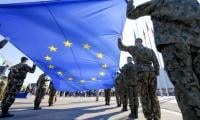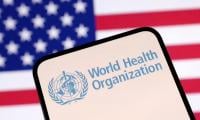Pakistan is part of Islamic military alliance: FO
Terrorism in India abetted by its extremist Hindu outfits; Kulbushan’s arrest proves Indian involvement in terrorism inside Pakistan; New Delhi ought to take care of Jinnah House
ISLAMABAD: Spokesman for Foreign Office (FO) Nafees Zakria has said that Pakistan has become a part of the alliance of 34 Muslim countries against terrorism while its Terms of Reference (ToRs) are yet to be formulated.
In the weekly briefing on Thursday, he said that terrorism in India was abetted by its extremist Hindu outfits. He said that RSS and other fascist organisations were involved in terrorist activities inside India and put the blame on Pakistan.
Nafees Zakaria said that Pakistan continued to suffer from Indian-sponsored terrorism. He said that the arrest of Indian spy Kulbushan Jadav was a validation of Islamabad’s claim that India was involved in creating instability and unrest in Pakistan.
He said that discrimination and mistreatment of minorities, especially the Muslims in India, had become the order of the day. He urged the international community, OIC and other world bodies to take notice of the persecution of religious minorities in India.
Nafees Zakaria also expressed the government’s concerns regarding the Jinnah House in Mumbai stating that the Indian government needed to respect the importance of the house for Pakistan.
“We have clarified our position on the Jinnah House matter to the Indian government,” the spokesman added. On Monday, a Bharatiya Janata Party (BJP) lawmaker Mangal Prabhat Lodha demanded that the residence be demolished and a cultural centre be built in its place.
Lodha, who is a property magnate in Mumbai, said that the Jinnah residence in south Mumbai was the place from where the conspiracy of Partition was hatched. “Jinnah House is a symbol of Partition. The structure should be demolished,” he said.
The demand came in the wake of the Indian Parliament passing controversial amendments to the Enemy Property Act 1968 earlier this month that are expected to pave the way for seizure of properties held by people who fled the country.
To a question, Nafees Zakaria hoped that India would fulfill its responsibilities towards maintenance and upkeep of the Jinnah House in Mumbai. The Ministry of Foreign Affairs steered itself away from the ongoing controversy regarding permission given by the Nawaz Sharif governmentto former COAS General (retd) Raheel Sharif to head the Saudi-led Islamic Military Alliance against terrorism, saying that ‘he was not aware’ if Saudi Arabia had contacted Islamabad on the diplomatic level.
“Pakistan is already part of (the military alliance). I have seen the statement made by the Minister of Defence. I don’t think after what has been said by him and the things which have been discussed in parliament, I have nothing to add,” spokesman said.
When questioned directly if the policy of the government of staying neutral had changed since now two governments have come to an agreement, he responded, “You are talking about two different things. The basic purpose of this force is counter terrorism. Terms of reference of counter terrorism operations were to be made."
On another sensitive issue related to former ambassador Husain Haqqani and whether he enjoyed diplomatic immunity, the spokesman responded, “It is important to understand what diplomatic immunity means. Any diplomat, serving or non-serving has no diplomatic immunity within his or her country. I think this answers your question”.
When asked whether there was a stringent visa regime being applied to the huge number of Chinese nationals who are entering Pakistan to avoid a “Haqqani” type of episode, the spokesman clarified tersely, “This is speculative in nature, and therefore, doesn’t warrant a response. Visa policies are made by the Ministry of Interior, after taking a number of aspects into consideration. In case you need more information on this, please contact them”.
On Afghanistan especially regarding the senior level meetings between the two sides recently in London which eventually saw Rawalpindi agreeing to open the Pak-Afghan border, the spokesman commented that both sides had realised “that terrorism is a common threat and to check terrorism effective border control management was imperative”.
Surprisingly, with April 14 fast approaching, the Foreign Office is being coy on naming the leader of the delegation to attend the Moscow conference on Afghanistan. At the previous Afghan conference, the foreign secretary had led the delegation. Since it would be unwise to downgrade the level of the head of the delegation, it seems prudent for the government to allow the new Foreign Secretary Tehmina Janjua to head it.
It would also provide an excellent opportunity for the foreign secretary who has spent a lot of time away from headquarters to meet on the sidelines of the conference with her regional counterparts amongst others Iran, India, Russia and China.
“Pakistan will participate in the forthcoming Moscow meeting in accordance with our policy of constructive engagement at all forums relating to Afghan peace," added the spokesman. Immediately after the meeting of the commissioners of the Indus Waters Treaty, Pakistan and India are due to meet in New Delhi for the yearly Coast Guard and Maritime Agency meeting.
“The meeting between the Indian Coast Guards and Pakistan Maritime Agency will be held from 16-19 April 2017 in New Delhi. The last meeting was held in July 2016 at the Ministry of Foreign Affairs in Islamabad, when the delegation of Indian coast guards visited Pakistan," said the spokesman.
Making note of the recently concluded visit of the delegation of Independent Permanent Human Rights Commission (IPHRC) of the Organisation of Islamic Cooperation (OIC), the spokesman said that the commission had observed that the use of restrictive and discriminatory laws by Indian security forces such as Armed Forces Special Powers Act is contrary to the international human rights standards.
“These laws grant sweeping powers to the security forces to detain, torture and even kill suspects without any fear of investigation. Also, the Kashmiri people are denied basic rights of peaceful assembly and association, freedom of expression and religion. There are widespread curfews and curbs on religious congregations for fear of protests and people have legitimate security concerns regarding protection of their right to life and dignity," he pointed out.
He also expressed shock and sadness while condemning “the continued bloodshed of innocent and defenceless Kashmiris in Indian-Held Kashmir”.
“To suppress the Kashmiris’ right to self-determination, India is using brute force and has embarked on a killing spree of Kashmiris. On Wednesday, they martyred four Kashmiris, including three teenagers and injured scores. In a most despicable act, the Indian occupation forces even opened live ammunition fire on those offering funeral prayers of the martyred. This killing and injuries to the Kashmiris is in addition to over 150 they have killed since July 8 and over 20,000 they injured," he said.
-
 Nicola Peltz's Ex's Sister Reveals 'truth' About Actress Amid Brooklyn Beckham Drama
Nicola Peltz's Ex's Sister Reveals 'truth' About Actress Amid Brooklyn Beckham Drama -
 Davos: Elon Musk’s Surprise Addition To The Schedule Draws Global Attention
Davos: Elon Musk’s Surprise Addition To The Schedule Draws Global Attention -
 Why Kylie Jenner's Family Loves Timothée Chalamet
Why Kylie Jenner's Family Loves Timothée Chalamet -
 World's Oldest Artwork: 68,000 Year-old Cave Paintings Discovered In Indonesia
World's Oldest Artwork: 68,000 Year-old Cave Paintings Discovered In Indonesia -
 Brooklyn Beckham’s Family Feud Shows No Signs Of Healing Anytime Soon
Brooklyn Beckham’s Family Feud Shows No Signs Of Healing Anytime Soon -
 Spain Calls For EU Joint Army After Trump’s Declaration Of Greenland Deal
Spain Calls For EU Joint Army After Trump’s Declaration Of Greenland Deal -
 Elon Musk Pokes Fun At Anthropic, Calls It 'misanthropic'
Elon Musk Pokes Fun At Anthropic, Calls It 'misanthropic' -
 Gwyneth Paltrow Opens Up About Coping With ‘anxiety’
Gwyneth Paltrow Opens Up About Coping With ‘anxiety’ -
 New Study Links ‘binge-watching Addiction’ To Increased Social Isolation
New Study Links ‘binge-watching Addiction’ To Increased Social Isolation -
 Jason Statham Reflects On Intenses Physical Demands Of Work
Jason Statham Reflects On Intenses Physical Demands Of Work -
 Why Cancer Comes Back And How Scientists Believe It Can Be Stopped
Why Cancer Comes Back And How Scientists Believe It Can Be Stopped -
 US To Exit WHO: A Seismic Shift In Global Health?
US To Exit WHO: A Seismic Shift In Global Health? -
 Palace Staff Reveals Nothing Has Changed For ‘disgraced’ Andrew After Losing Titles
Palace Staff Reveals Nothing Has Changed For ‘disgraced’ Andrew After Losing Titles -
 How Did Taylor Swift Cope With ‘exhausting’ Sickness During Popular ‘Eras Tour’
How Did Taylor Swift Cope With ‘exhausting’ Sickness During Popular ‘Eras Tour’ -
 Artists Launch ‘Stealing Isn’t Innovation’ Campaign Against AI Use
Artists Launch ‘Stealing Isn’t Innovation’ Campaign Against AI Use -
 Elon Musk’s XAI Grok Imagine Now Generates 10-second Videos With Sharper Quality: Here’s How
Elon Musk’s XAI Grok Imagine Now Generates 10-second Videos With Sharper Quality: Here’s How



